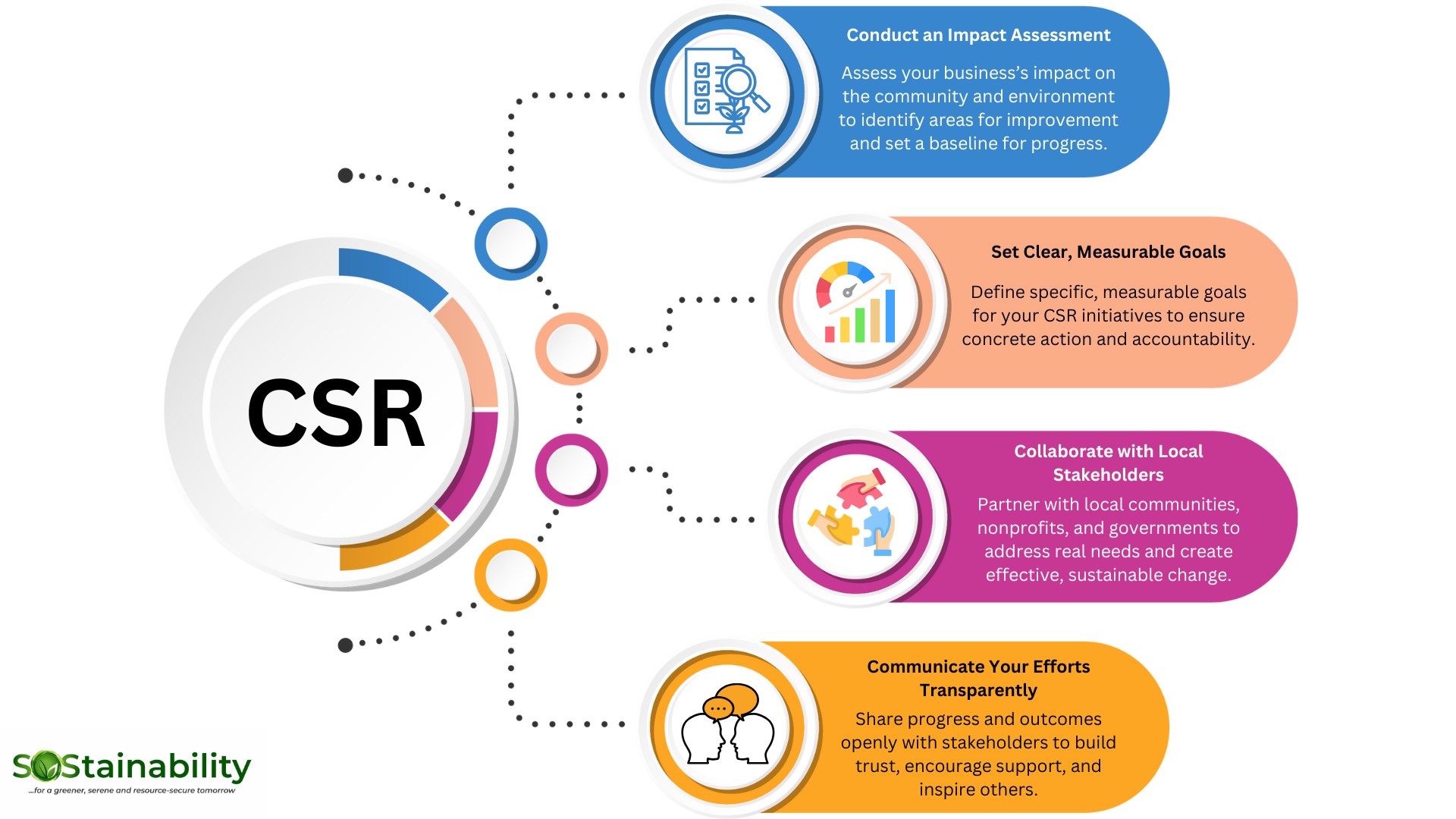
26 Mar Social Value vs CSR: Understanding the Key Differences and What It Means for Businesses
Social Value vs CSR: What Businesses Need to Know
In an era where businesses are increasingly expected to contribute to society, understanding the distinction between Social Value and Corporate Social Responsibility (CSR) is more crucial than ever. As businesses expand their roles within their communities, it’s essential to comprehend how each approach can help achieve both ethical goals and business success.
This article takes a deep dive into the differences, examples, and practical steps businesses can take to leverage these concepts for greater impact.
What is Social Value?
Social Value refers to the broad range of societal benefits that businesses can create through their operations. It encompasses positive changes that a business contributes to in the community, beyond the immediate objective of profit-making.
Social value initiatives often address societal challenges, including education, employment, healthcare, and environmental sustainability. The goal is not just about doing good, but making a long-term, measurable impact that leaves a positive legacy.
For instance, a company involved in environmental sustainability by reducing its carbon footprint is not only contributing to a cleaner planet but also helping society by promoting healthier living conditions. The social value created is often aligned with addressing community problems that need systemic solutions, helping businesses leave a positive mark on their surroundings.
What is CSR?
Corporate Social Responsibility (CSR), on the other hand, focuses on how businesses integrate ethical behavior into their daily operations. CSR is about ensuring that a business acts responsibly towards society by minimizing negative impacts and addressing ethical issues such as labor rights, environmental protection, and fair trade practices.
CSR encompasses a broad range of voluntary activities that a company can adopt to balance the interests of all stakeholders, including employees, customers, suppliers, and investors.
While Social Value often impacts the broader society outside the company and are intentionally designed into the business or operational model, CSR initiatives tend to be more internal, ad-hoc and sporadic.
For example, social value can involve setting up ethical supply chains, ensuring diversity and inclusion, or supporting local charities through donations or volunteer efforts.
The Key Differences Between Social Value and CSR
While both Social Value and CSR aim to improve society and tackle global challenges, the approaches and outcomes differ significantly. Let’s break down the key differences:
1) Scope and Focus
Social Value: Primarily external, focusing on creating long-term positive changes in society. These initiatives are designed to address societal issues such as poverty, education gaps, or environmental degradation.
CSR: More internally focused, with emphasis on voluntary contributions to society’s well being.
2) Stakeholder Engagement
Social Value: Involves a broader range of stakeholders, from employees to investors. CSR focuses on improving overall business sustainability and balancing the tripple bottom line interests of all parties involved with the company.
CSR: Directly targets specific community stakeholders. It aims to alleviate social problems in specific areas or communities, often by collaborating with local groups and organizations.
3) Implementation and Reporting
Social Value: Social value initiatives often require direct involvement and engagement from the company. Their success is usually evaluated through tangible, measurable outcomes, such as the number of jobs created or the reduction in carbon emissions.
CSR: CSR initiatives are often indirect and may involve audits, reporting, and ethical codes of conduct for employees. The evaluation process is typically less concrete than social value, focusing more on assessing how CSR activities align with company values.
4) Long-term vs. Short-term Impact
Social Value: Results in long-term positive changes for the community, with ongoing improvements in social, environmental, or economic conditions.
CSR: Often seen as a series of short-term activities, which may not always result in lasting change but can significantly improve the company’s reputation and stakeholder trust.

Real-World Impact: Social Value and CSR in Action
Understanding how Social Value and CSR translate into tangible action is key for businesses looking to make a real difference. Here are some practical examples that demonstrate the positive impact these initiatives can have:
Examples of Social Value Initiatives
- Environmental Sustainability: Many companies are increasingly committed to reducing their carbon footprint. This might involve transitioning to renewable energy sources, implementing energy-efficient technologies, or minimizing waste in production processes.
These initiatives not only lower operational costs in the long run but also contribute directly to environmental well-being by reducing pollution, preserving resources, and combating climate change. By focusing on environmental sustainability, businesses help build a cleaner, healthier planet for future generations.
- Local Hiring Programs: Social value is often created by providing economic stability through job creation. Companies can focus on local hiring, offering employment opportunities to individuals in underprivileged or marginalized communities. By supporting local economies, businesses can reduce unemployment, empower individuals, and foster greater economic equality. These programs also strengthen the relationship between companies and the communities they serve, creating a more engaged and motivated workforce.
- Supporting Education: Another powerful example of Social Value creation is in the field of education. Businesses can partner with non-profit organizations or schools to offer resources, scholarships, or mentoring programs for students in underserved communities.
These initiatives bridge the education gap, providing access to knowledge and skills that can improve future job prospects. In turn, companies benefit from developing a well-educated workforce that can contribute to the economy.
Examples of CSR Initiatives
- Ethical Sourcing: CSR often involves ensuring that a company’s supply chain adheres to strict ethical standards. This includes sourcing products from suppliers that follow fair labor practices, ensure worker safety, and avoid exploitation.
A prime example is the fashion industry, where many companies are now committed to sustainable sourcing and avoiding suppliers that use child labor or contribute to environmental degradation. By implementing ethical sourcing practices, businesses build trust with consumers who value socially responsible brands.
- Philanthropy: Philanthropic efforts are a key aspect of CSR. Companies often contribute to charities, support disaster relief funds, or invest in community projects. While these actions may not always result in direct financial gain, they enhance the company’s reputation and establish it as a force for good in society.
For example, a company might donate a portion of its profits to build schools or provide healthcare services in underdeveloped regions, which boosts their corporate image and helps address critical social issues.
- Employee Volunteer Programs: Encouraging employees to volunteer in their local communities is another effective way to engage in CSR. Many companies organize volunteer days or community outreach programs where employees donate their time to help local causes. These initiatives not only support community welfare but also boost employee morale and strengthen the corporate culture. Employees feel more connected to their company and its mission, which fosters a sense of pride and loyalty.
By implementing Social Value and CSR initiatives, companies not only contribute positively to society but also create long-lasting relationships with their customers, employees, and stakeholders. These efforts go beyond mere charity; they build a sustainable business model that aligns financial success with social good, positioning companies as leaders in corporate responsibility.

Why Businesses Should Care About Both Social Value and CSR
Social Value and Corporate Social Responsibility (CSR) are essential drivers of long-term business success, going beyond just reputation management. They create lasting benefits for communities and the environment, ultimately supporting a company’s sustainability goals.
As sustainability becomes a central imperative, both Social Value and CSR play a crucial role in shaping a company’s future. Rather than being separate initiatives, they are integral components of a comprehensive sustainability strategy. By focusing on these areas, businesses can ensure they are not only meeting current needs but also contributing to a more responsible and resilient future.
Here are the key reasons why businesses should prioritize both approaches:
Enhancing Brand Reputation
In today’s market, consumers are more socially conscious than ever before. The growing demand for transparency, ethical practices, and sustainability has led to a shift in how consumers evaluate businesses.
Consumers increasingly seek companies that align with their values, care about the environment, and make a tangible impact on society. Brands that engage in meaningful social initiatives, such as environmental sustainability, community development, or ethical labor practices, often enjoy enhanced brand perception and greater consumer trust. This shift is particularly pronounced in younger demographics, such as Millennials and Generation Z, who tend to support businesses that actively promote positive social change.
As consumers become more discerning, businesses that demonstrate genuine commitment to social responsibility through Social Value and CSR initiatives are more likely to develop strong relationships with their target audience. These efforts not only differentiate companies from competitors but also help them cultivate brand loyalty.
When a business stands behind its values and demonstrates its impact on society, it strengthens its reputation, making consumers more likely to advocate for and recommend the brand. As a result, companies that invest in social good can expect long-term benefits in terms of customer retention and brand equity.
Attracting and Retaining Talent
Another key reason businesses should embrace Social Value and CSR is to attract and retain top talent. In a competitive job market, employees are increasingly seeking workplaces that go beyond just offering a paycheck.
They want to work for companies that contribute to the greater good and prioritize social impact. In particular, younger generations, such as Millennials and Generation Z, are highly motivated by purpose-driven work.
These individuals tend to favor companies that offer more than just financial rewards—they want to be part of something that aligns with their personal values and makes a meaningful difference in the world.
By actively engaging in CSR and creating social value, companies can position themselves as attractive employers to individuals who prioritize ethical considerations and sustainability in their career choices.
Moreover, fostering a workplace culture centered around social responsibility can enhance employee satisfaction and morale, reducing turnover rates and improving overall employee retention.
Employees are more likely to stay with an organization that reflects their values, and a business that demonstrates a genuine commitment to ethical practices and social initiatives will naturally attract a talented and motivated workforce. This focus on employee well-being and social contribution can lead to higher levels of engagement, productivity, and job satisfaction.
Securing Investment and Funding
Investors today are placing increasing importance on companies that demonstrate social responsibility and sustainability. In the past, the financial performance of a company was the primary driver for investment decisions.
However, the growing trend towards Environmental, Social, and Governance (ESG) investing has shifted this paradigm. Investors are now more likely to fund companies that demonstrate a long-term commitment to sustainability, ethical practices, and positive social impact.
As the demand for responsible investment grows, businesses that showcase their Social Value and CSR efforts are better positioned to attract funding from socially conscious investors who prioritize both financial returns and social good.
Furthermore, businesses that incorporate social responsibility into their core operations are less likely to face reputational risks or legal issues, making them more attractive to investors who are concerned about long-term sustainability.
By highlighting CSR initiatives and social value creation in their reports and communications, companies can signal to investors that they are future-proofing their business. This can lead to increased access to funding opportunities, better valuation, and stronger partnerships with investment groups that prioritize long-term value over short-term profits.
In a rapidly evolving financial landscape, showcasing a company’s commitment to social impact can provide a competitive edge when vying for investor attention and capital.
Long-Term Profitability
Studies have shown that businesses with strong CSR practices are more profitable in the long run. While some may see CSR initiatives as a cost or an unnecessary expense, research demonstrates that businesses that invest in sustainability, ethical labor practices, and social impact often experience greater profitability over time.
By focusing on long-term goals, such as environmental sustainability and community support, businesses not only contribute to societal well-being but also open up new markets and attract loyal customers who are willing to pay a premium for products and services from responsible companies.
Companies that engage in social value creation are also more likely to build strong customer loyalty. When a business demonstrates that it is committed to making a positive difference, consumers are more inclined to choose its products over competitors’ offerings.
Moreover, businesses that actively address social and environmental issues are less susceptible to the risks posed by regulatory changes, environmental challenges, or shifts in consumer preferences. By integrating social responsibility into their core business strategy, companies can reduce operational risks, enhance their reputation, and create a competitive advantage that drives long-term profitability.
CSR and social value initiatives contribute to resilience and sustainability, ensuring that businesses can thrive in an increasingly conscious and environmentally aware market.

How to Integrate Social Value and CSR into Your Business Strategy
Integrating Social Value and Corporate Social Responsibility (CSR) into a business strategy is not just about adopting policies but creating an actionable framework that brings about tangible change both within the company and the community. For businesses eager to make a real difference, here are some practical steps to implement these concepts effectively.
Conduct an Impact Assessment
Before embarking on Social Value and CSR initiatives, it’s essential to conduct a thorough impact assessment of your business operations. This assessment helps to evaluate how your company’s activities are currently affecting the community and the environment.
Start by reviewing your supply chain, waste management practices, energy consumption, and employee relations. This comprehensive evaluation allows you to identify areas where your company’s operations may have a negative impact, as well as areas where positive change is possible.
Understanding your current impact is crucial because it helps you pinpoint which aspects of your operations align with Social Value and CSR objectives. For example, if your business is involved in manufacturing, you might find opportunities to reduce carbon emissions, lower waste output, or implement ethical sourcing practices. This assessment provides a baseline against which progress can be measured, ensuring that your company is taking targeted actions that will truly make a difference.
Without a clear understanding of where improvements are needed, your efforts might be misguided or ineffective. Therefore, the assessment serves as the first step toward creating a strategy that not only addresses the current gaps but also leads to meaningful societal change.
Set Clear, Measurable Goals
Once the impact assessment is complete, it’s time to set clear, measurable goals for your Social Value and CSR initiatives. Goals are essential because they provide direction and ensure that your efforts are not just vague aspirations but concrete actions.
Whether it’s reducing your company’s carbon footprint, donating a specific percentage of profits to charity, or creating a set number of jobs in the local community, your goals need to be specific, measurable, and aligned with your business’s values.
Measurable objectives ensure that your initiatives remain focused and impactful. For example, instead of saying “We aim to be more sustainable,” a company should set a clear target such as “Reduce carbon emissions by 30% over the next five years.”
These goals should be quantifiable and have time-bound deadlines to track progress. Additionally, setting clear goals enables you to hold your business accountable, ensuring that you meet your commitments and demonstrate tangible outcomes to stakeholders.
The more specific and measurable your goals, the more effectively you can measure your progress and adjust strategies if needed, ensuring that your Social Value and CSR initiatives are aligned with your overarching business objectives.
Collaborate with Local Stakeholders
The success of any Social Value or CSR initiative heavily relies on collaboration with local stakeholders. Businesses that engage with local communities, non-profit organizations, and government entities can ensure their initiatives address the most pressing needs and challenges faced by the communities they serve.
Building partnerships with local stakeholders helps businesses gain insights into the specific issues that require attention, whether it’s unemployment, environmental sustainability, or healthcare access.
Collaboration is crucial for ensuring that your initiatives are relevant and effective. By working together with community organizations and local leaders, businesses can align their efforts with existing community strategies, creating more meaningful and sustainable change.
Additionally, partnerships with nonprofits can provide businesses with the expertise and resources needed to execute initiatives effectively. For example, partnering with a local non-profit focused on education can help a company create educational programs or provide scholarships for underprivileged youth.
Moreover, working with local government entities may provide access to public funding or opportunities to be part of larger-scale community development projects. By collaborating, businesses not only enhance the impact of their initiatives but also contribute to building stronger, more resilient communities.
Communicate Your Efforts Transparently
Once your Social Value and CSR initiatives are underway, it’s essential to communicate your efforts transparently. Transparency builds trust with your stakeholders—whether it’s customers, employees, investors, or the broader community. Openly sharing the goals you’ve set, the progress you’ve made, and the outcomes of your initiatives ensures that stakeholders are informed and engaged in your company’s social impact journey.
Effective communication about your Social Value and CSR initiatives can also strengthen relationships and foster a sense of pride among employees and customers. For employees, understanding that their work is contributing to a larger purpose can boost morale and motivation.
For customers, knowing that their purchases are supporting a company that is making a positive impact can lead to increased brand loyalty and customer retention. Businesses can communicate their efforts through various channels, such as annual CSR reports, social media updates, and company newsletters.
Regular updates and transparency about your progress not only demonstrate accountability but also inspire other companies to adopt similar initiatives. By ensuring that your social impact efforts are visible, you create a cycle of engagement and support that amplifies your social value and strengthens your company’s standing as a responsible business.
Take Action for a Purpose-Driven Future
To thrive in today’s competitive and socially conscious market, businesses must move beyond traditional profit-driven models. Integrating Social Value and CSR into your company’s strategy isn’t just a trend—it’s a responsibility. As leaders in your industry, you have the power to shape not only your business’s future but also the communities and environments you impact.
Start by aligning your business objectives with societal needs, fostering long-term change, and creating measurable benefits for the community.
The future is about more than financial success—it’s about making an ethical, lasting impact. Whether it’s through reducing your environmental footprint, promoting social equality, or supporting local initiatives, your efforts will resonate with both customers and investors who prioritize purpose.
Now is the time to step up and take responsibility. Establish clear, actionable goals, engage with local stakeholders, and communicate your progress transparently. By committing to Social Value and CSR, you not only enhance your reputation but position your business as a leader in the ethical marketplace. Embrace this opportunity to drive positive change—your business and society will thrive together.
Here’s where SOStainability comes in
At SOStainability, we specialize in guiding businesses, communities, and organizations to successfully integrate sustainability and CSR into their strategies. We offer consultations tailored to your unique needs, helping you drive positive change that benefits both your bottom line and the world around you. Whether you’re looking for sustainability assessments, ethical marketing strategies, or tailored training, our team is here to support your journey.
For consultations or business inquiries, please reach out to us at hello@sostainability.co.uk.
SOSfact: Did you know that businesses integrating Social Value into their operations can increase their long-term profitability by up to 23%? Start making a difference today!
SOSFact for the Day



No Comments